The Effectiveness of Sustainable Management in Hospitality: IHG Study
VerifiedAdded on 2022/12/23
|13
|3735
|66
Report
AI Summary
This research project investigates the effectiveness of sustainable management practices within the hospitality industry, with a specific focus on InterContinental Hotels & Resorts (IHG). The study begins with an introduction outlining the background, aims, objectives, and research questions, as well as the significance of the research. A comprehensive literature review explores the concept of sustainable management, its benefits for hospitality organizations, different sustainable practices (such as recycling, waste reduction, and energy conservation), and the challenges associated with implementation. The research methodology details the research philosophy (interpretivism), approach (inductive), strategy, design, and data collection methods, including interview questions. The sampling method used is simple random probability sampling, with 10 respondents from InterContinental Hotel. The data analysis and interpretation section presents the findings, organized into themes such as awareness of sustainable management, its significance, and the benefits of adoption. The study concludes by summarizing the key findings and their implications for IHG and the broader hospitality industry, highlighting the importance of sustainable practices for long-term success.
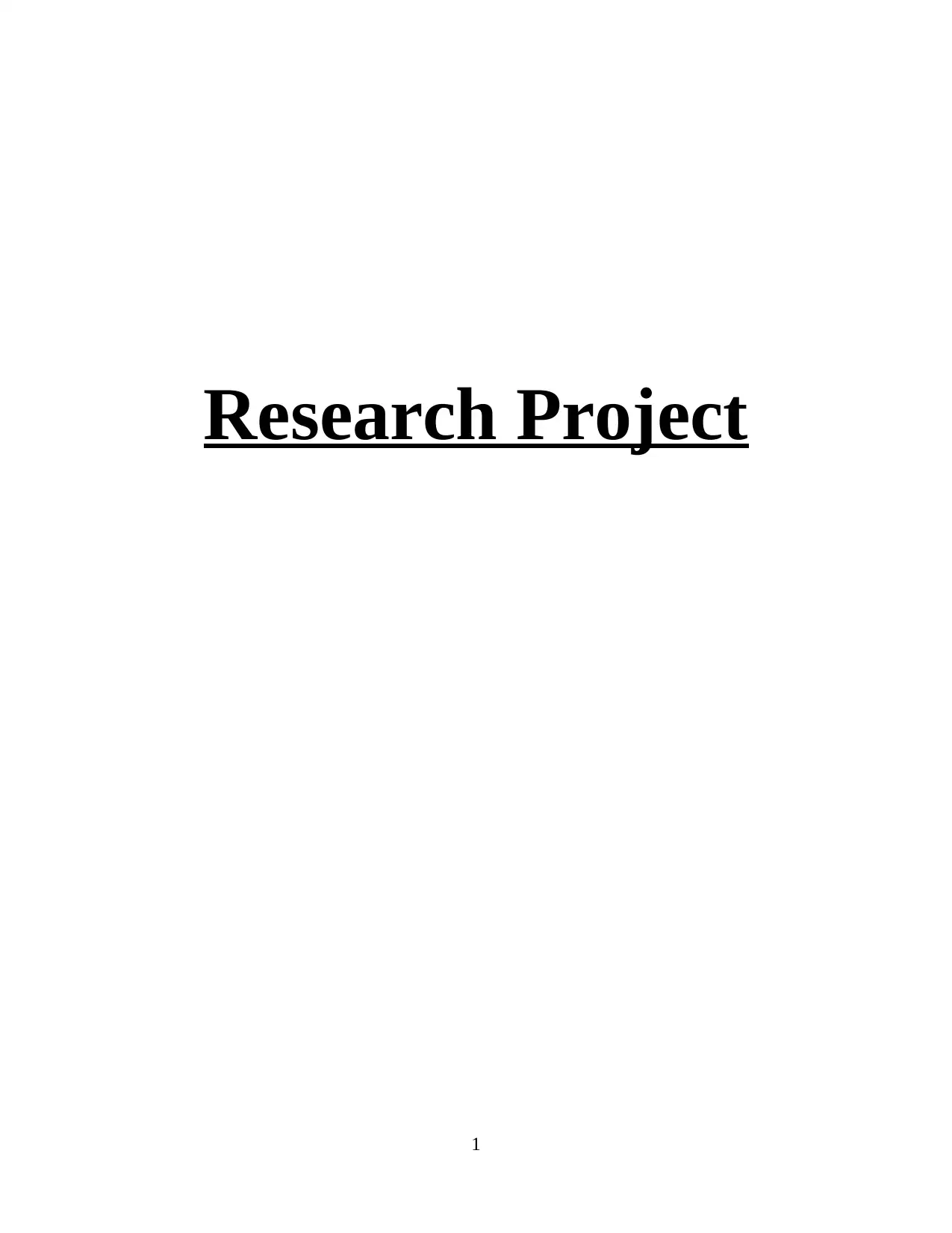
Research Project
1
1
Paraphrase This Document
Need a fresh take? Get an instant paraphrase of this document with our AI Paraphraser
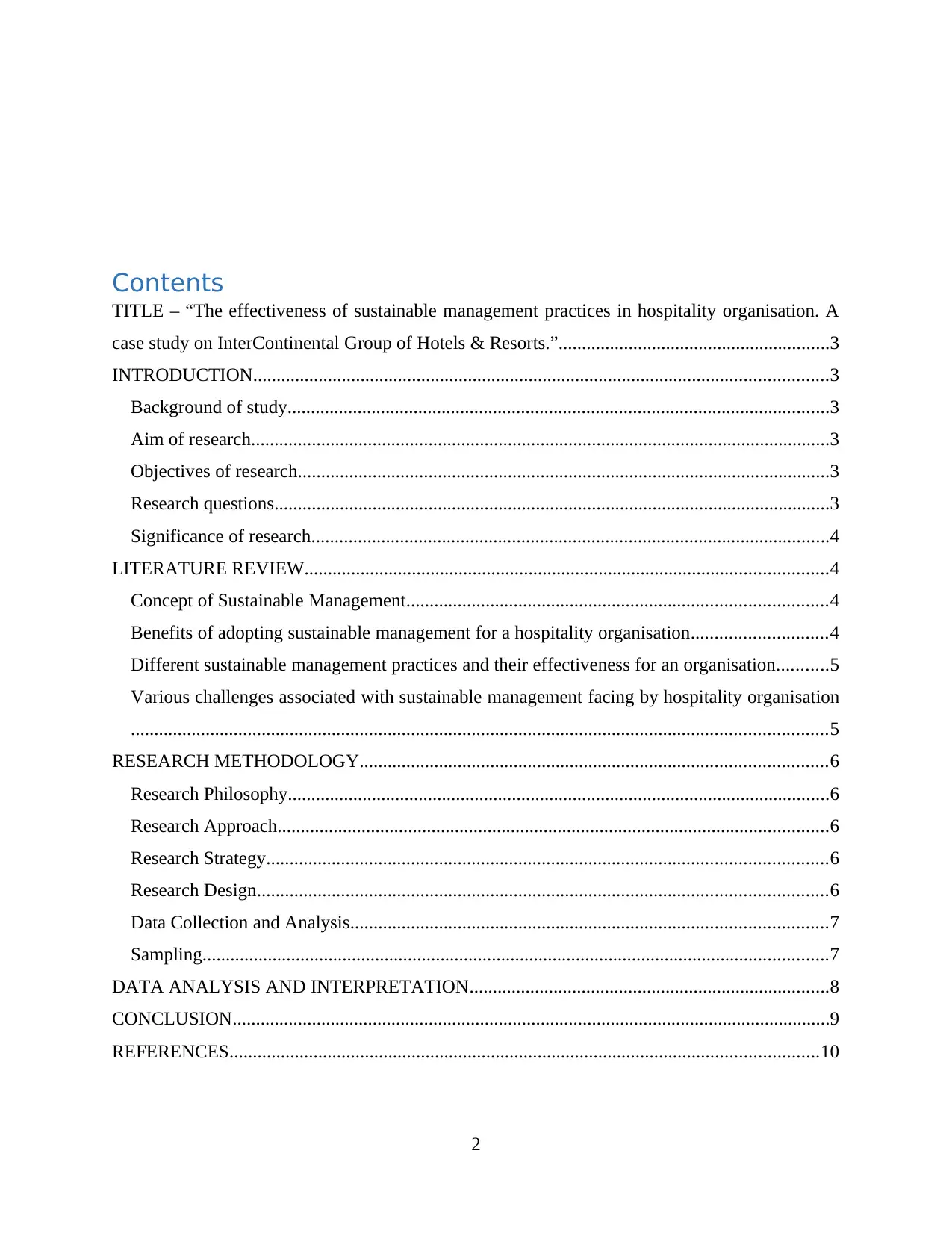
Contents
TITLE – “The effectiveness of sustainable management practices in hospitality organisation. A
case study on InterContinental Group of Hotels & Resorts.”..........................................................3
INTRODUCTION...........................................................................................................................3
Background of study....................................................................................................................3
Aim of research............................................................................................................................3
Objectives of research..................................................................................................................3
Research questions.......................................................................................................................3
Significance of research...............................................................................................................4
LITERATURE REVIEW................................................................................................................4
Concept of Sustainable Management..........................................................................................4
Benefits of adopting sustainable management for a hospitality organisation.............................4
Different sustainable management practices and their effectiveness for an organisation...........5
Various challenges associated with sustainable management facing by hospitality organisation
.....................................................................................................................................................5
RESEARCH METHODOLOGY....................................................................................................6
Research Philosophy....................................................................................................................6
Research Approach......................................................................................................................6
Research Strategy........................................................................................................................6
Research Design..........................................................................................................................6
Data Collection and Analysis......................................................................................................7
Sampling......................................................................................................................................7
DATA ANALYSIS AND INTERPRETATION.............................................................................8
CONCLUSION................................................................................................................................9
REFERENCES..............................................................................................................................10
2
TITLE – “The effectiveness of sustainable management practices in hospitality organisation. A
case study on InterContinental Group of Hotels & Resorts.”..........................................................3
INTRODUCTION...........................................................................................................................3
Background of study....................................................................................................................3
Aim of research............................................................................................................................3
Objectives of research..................................................................................................................3
Research questions.......................................................................................................................3
Significance of research...............................................................................................................4
LITERATURE REVIEW................................................................................................................4
Concept of Sustainable Management..........................................................................................4
Benefits of adopting sustainable management for a hospitality organisation.............................4
Different sustainable management practices and their effectiveness for an organisation...........5
Various challenges associated with sustainable management facing by hospitality organisation
.....................................................................................................................................................5
RESEARCH METHODOLOGY....................................................................................................6
Research Philosophy....................................................................................................................6
Research Approach......................................................................................................................6
Research Strategy........................................................................................................................6
Research Design..........................................................................................................................6
Data Collection and Analysis......................................................................................................7
Sampling......................................................................................................................................7
DATA ANALYSIS AND INTERPRETATION.............................................................................8
CONCLUSION................................................................................................................................9
REFERENCES..............................................................................................................................10
2
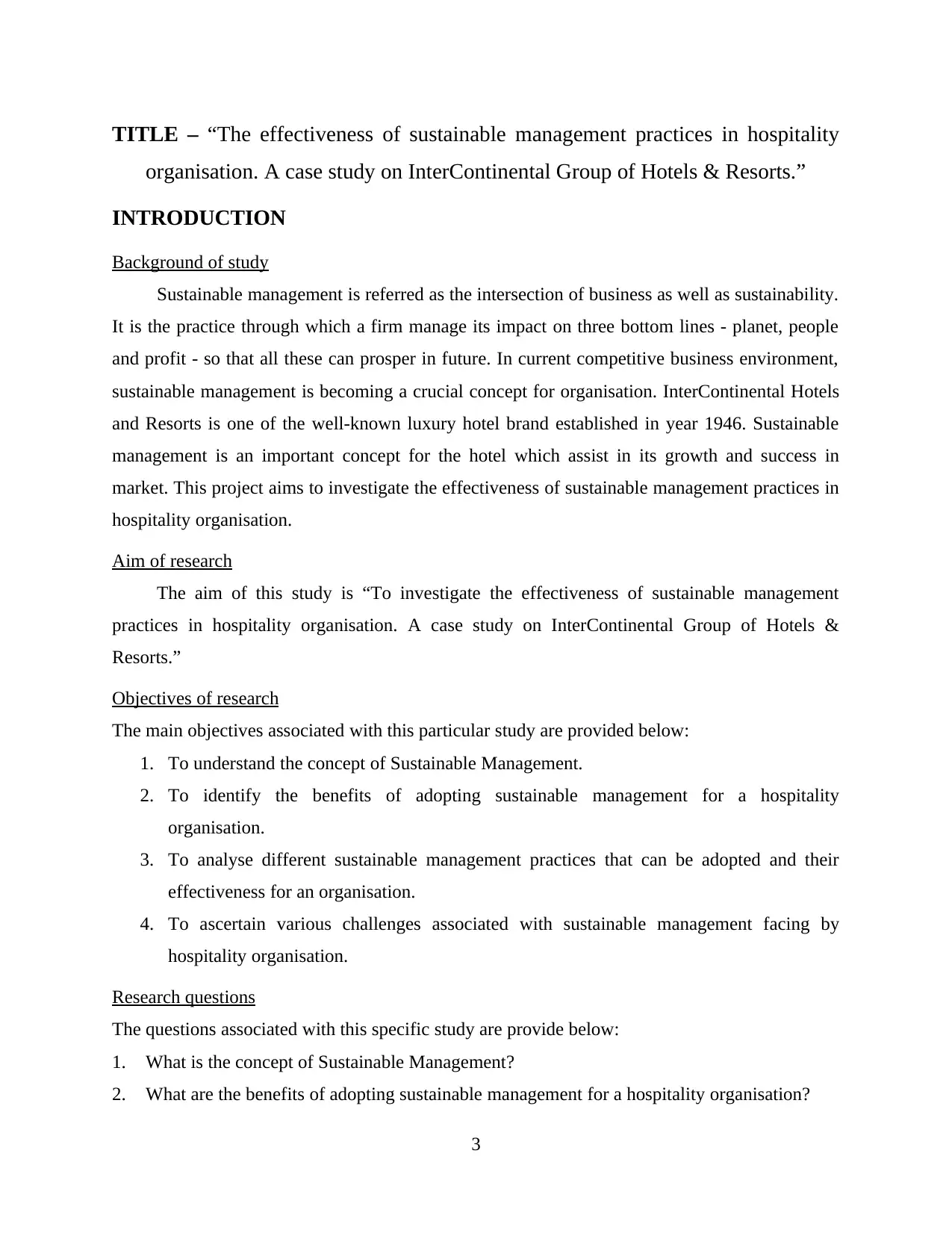
TITLE – “The effectiveness of sustainable management practices in hospitality
organisation. A case study on InterContinental Group of Hotels & Resorts.”
INTRODUCTION
Background of study
Sustainable management is referred as the intersection of business as well as sustainability.
It is the practice through which a firm manage its impact on three bottom lines - planet, people
and profit - so that all these can prosper in future. In current competitive business environment,
sustainable management is becoming a crucial concept for organisation. InterContinental Hotels
and Resorts is one of the well-known luxury hotel brand established in year 1946. Sustainable
management is an important concept for the hotel which assist in its growth and success in
market. This project aims to investigate the effectiveness of sustainable management practices in
hospitality organisation.
Aim of research
The aim of this study is “To investigate the effectiveness of sustainable management
practices in hospitality organisation. A case study on InterContinental Group of Hotels &
Resorts.”
Objectives of research
The main objectives associated with this particular study are provided below:
1. To understand the concept of Sustainable Management.
2. To identify the benefits of adopting sustainable management for a hospitality
organisation.
3. To analyse different sustainable management practices that can be adopted and their
effectiveness for an organisation.
4. To ascertain various challenges associated with sustainable management facing by
hospitality organisation.
Research questions
The questions associated with this specific study are provide below:
1. What is the concept of Sustainable Management?
2. What are the benefits of adopting sustainable management for a hospitality organisation?
3
organisation. A case study on InterContinental Group of Hotels & Resorts.”
INTRODUCTION
Background of study
Sustainable management is referred as the intersection of business as well as sustainability.
It is the practice through which a firm manage its impact on three bottom lines - planet, people
and profit - so that all these can prosper in future. In current competitive business environment,
sustainable management is becoming a crucial concept for organisation. InterContinental Hotels
and Resorts is one of the well-known luxury hotel brand established in year 1946. Sustainable
management is an important concept for the hotel which assist in its growth and success in
market. This project aims to investigate the effectiveness of sustainable management practices in
hospitality organisation.
Aim of research
The aim of this study is “To investigate the effectiveness of sustainable management
practices in hospitality organisation. A case study on InterContinental Group of Hotels &
Resorts.”
Objectives of research
The main objectives associated with this particular study are provided below:
1. To understand the concept of Sustainable Management.
2. To identify the benefits of adopting sustainable management for a hospitality
organisation.
3. To analyse different sustainable management practices that can be adopted and their
effectiveness for an organisation.
4. To ascertain various challenges associated with sustainable management facing by
hospitality organisation.
Research questions
The questions associated with this specific study are provide below:
1. What is the concept of Sustainable Management?
2. What are the benefits of adopting sustainable management for a hospitality organisation?
3
⊘ This is a preview!⊘
Do you want full access?
Subscribe today to unlock all pages.

Trusted by 1+ million students worldwide
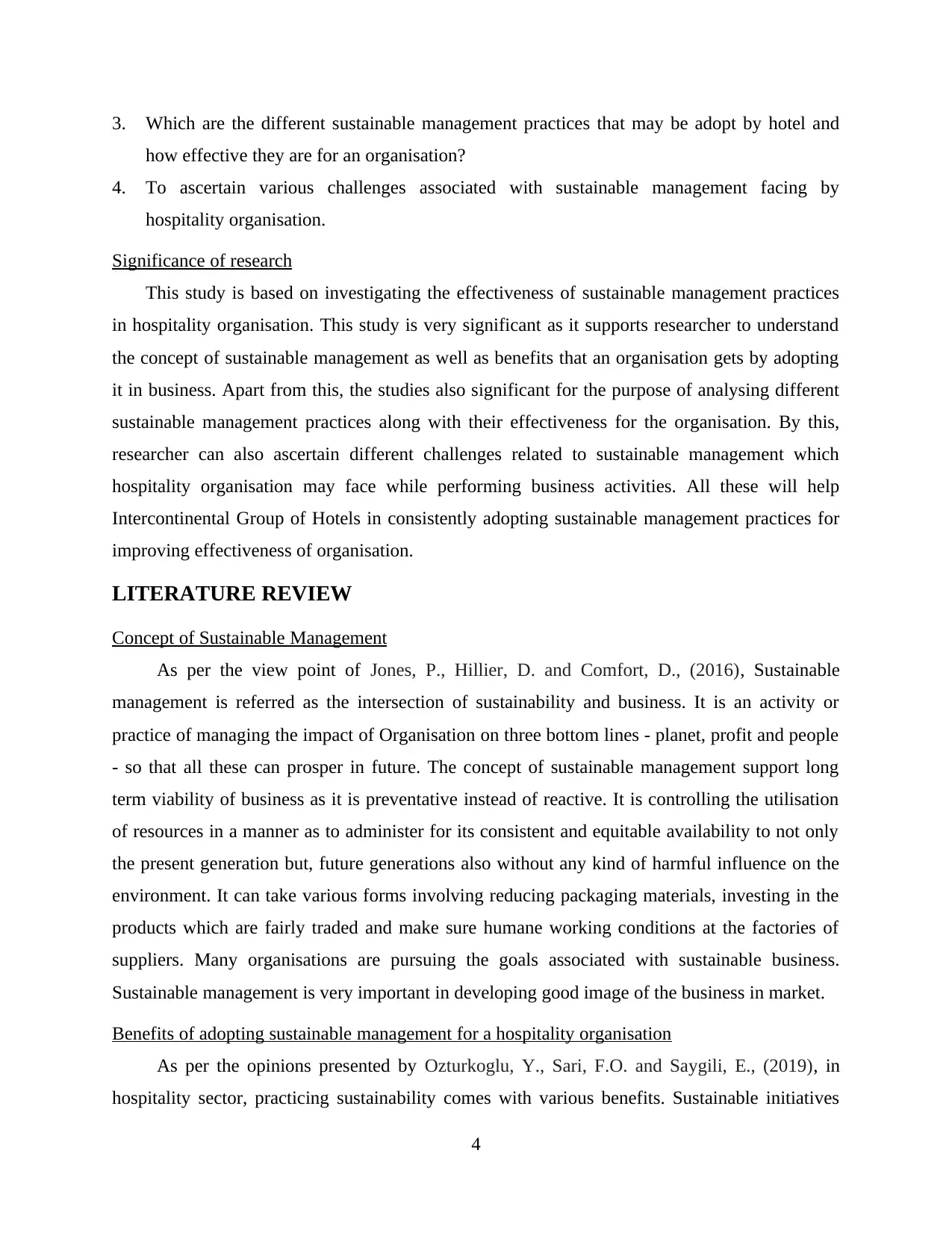
3. Which are the different sustainable management practices that may be adopt by hotel and
how effective they are for an organisation?
4. To ascertain various challenges associated with sustainable management facing by
hospitality organisation.
Significance of research
This study is based on investigating the effectiveness of sustainable management practices
in hospitality organisation. This study is very significant as it supports researcher to understand
the concept of sustainable management as well as benefits that an organisation gets by adopting
it in business. Apart from this, the studies also significant for the purpose of analysing different
sustainable management practices along with their effectiveness for the organisation. By this,
researcher can also ascertain different challenges related to sustainable management which
hospitality organisation may face while performing business activities. All these will help
Intercontinental Group of Hotels in consistently adopting sustainable management practices for
improving effectiveness of organisation.
LITERATURE REVIEW
Concept of Sustainable Management
As per the view point of Jones, P., Hillier, D. and Comfort, D., (2016), Sustainable
management is referred as the intersection of sustainability and business. It is an activity or
practice of managing the impact of Organisation on three bottom lines - planet, profit and people
- so that all these can prosper in future. The concept of sustainable management support long
term viability of business as it is preventative instead of reactive. It is controlling the utilisation
of resources in a manner as to administer for its consistent and equitable availability to not only
the present generation but, future generations also without any kind of harmful influence on the
environment. It can take various forms involving reducing packaging materials, investing in the
products which are fairly traded and make sure humane working conditions at the factories of
suppliers. Many organisations are pursuing the goals associated with sustainable business.
Sustainable management is very important in developing good image of the business in market.
Benefits of adopting sustainable management for a hospitality organisation
As per the opinions presented by Ozturkoglu, Y., Sari, F.O. and Saygili, E., (2019), in
hospitality sector, practicing sustainability comes with various benefits. Sustainable initiatives
4
how effective they are for an organisation?
4. To ascertain various challenges associated with sustainable management facing by
hospitality organisation.
Significance of research
This study is based on investigating the effectiveness of sustainable management practices
in hospitality organisation. This study is very significant as it supports researcher to understand
the concept of sustainable management as well as benefits that an organisation gets by adopting
it in business. Apart from this, the studies also significant for the purpose of analysing different
sustainable management practices along with their effectiveness for the organisation. By this,
researcher can also ascertain different challenges related to sustainable management which
hospitality organisation may face while performing business activities. All these will help
Intercontinental Group of Hotels in consistently adopting sustainable management practices for
improving effectiveness of organisation.
LITERATURE REVIEW
Concept of Sustainable Management
As per the view point of Jones, P., Hillier, D. and Comfort, D., (2016), Sustainable
management is referred as the intersection of sustainability and business. It is an activity or
practice of managing the impact of Organisation on three bottom lines - planet, profit and people
- so that all these can prosper in future. The concept of sustainable management support long
term viability of business as it is preventative instead of reactive. It is controlling the utilisation
of resources in a manner as to administer for its consistent and equitable availability to not only
the present generation but, future generations also without any kind of harmful influence on the
environment. It can take various forms involving reducing packaging materials, investing in the
products which are fairly traded and make sure humane working conditions at the factories of
suppliers. Many organisations are pursuing the goals associated with sustainable business.
Sustainable management is very important in developing good image of the business in market.
Benefits of adopting sustainable management for a hospitality organisation
As per the opinions presented by Ozturkoglu, Y., Sari, F.O. and Saygili, E., (2019), in
hospitality sector, practicing sustainability comes with various benefits. Sustainable initiatives
4
Paraphrase This Document
Need a fresh take? Get an instant paraphrase of this document with our AI Paraphraser
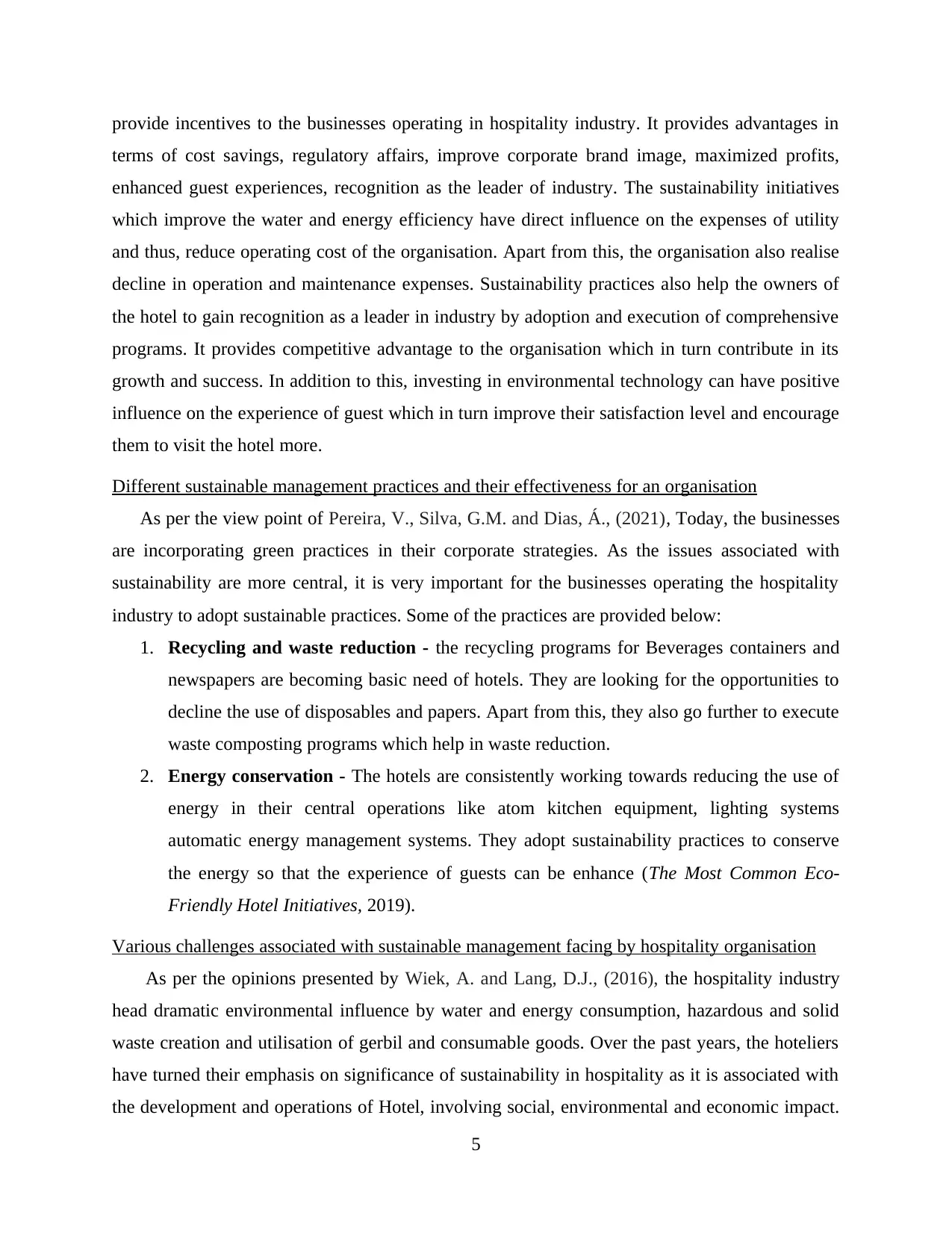
provide incentives to the businesses operating in hospitality industry. It provides advantages in
terms of cost savings, regulatory affairs, improve corporate brand image, maximized profits,
enhanced guest experiences, recognition as the leader of industry. The sustainability initiatives
which improve the water and energy efficiency have direct influence on the expenses of utility
and thus, reduce operating cost of the organisation. Apart from this, the organisation also realise
decline in operation and maintenance expenses. Sustainability practices also help the owners of
the hotel to gain recognition as a leader in industry by adoption and execution of comprehensive
programs. It provides competitive advantage to the organisation which in turn contribute in its
growth and success. In addition to this, investing in environmental technology can have positive
influence on the experience of guest which in turn improve their satisfaction level and encourage
them to visit the hotel more.
Different sustainable management practices and their effectiveness for an organisation
As per the view point of Pereira, V., Silva, G.M. and Dias, Á., (2021), Today, the businesses
are incorporating green practices in their corporate strategies. As the issues associated with
sustainability are more central, it is very important for the businesses operating the hospitality
industry to adopt sustainable practices. Some of the practices are provided below:
1. Recycling and waste reduction - the recycling programs for Beverages containers and
newspapers are becoming basic need of hotels. They are looking for the opportunities to
decline the use of disposables and papers. Apart from this, they also go further to execute
waste composting programs which help in waste reduction.
2. Energy conservation - The hotels are consistently working towards reducing the use of
energy in their central operations like atom kitchen equipment, lighting systems
automatic energy management systems. They adopt sustainability practices to conserve
the energy so that the experience of guests can be enhance (The Most Common Eco-
Friendly Hotel Initiatives, 2019).
Various challenges associated with sustainable management facing by hospitality organisation
As per the opinions presented by Wiek, A. and Lang, D.J., (2016), the hospitality industry
head dramatic environmental influence by water and energy consumption, hazardous and solid
waste creation and utilisation of gerbil and consumable goods. Over the past years, the hoteliers
have turned their emphasis on significance of sustainability in hospitality as it is associated with
the development and operations of Hotel, involving social, environmental and economic impact.
5
terms of cost savings, regulatory affairs, improve corporate brand image, maximized profits,
enhanced guest experiences, recognition as the leader of industry. The sustainability initiatives
which improve the water and energy efficiency have direct influence on the expenses of utility
and thus, reduce operating cost of the organisation. Apart from this, the organisation also realise
decline in operation and maintenance expenses. Sustainability practices also help the owners of
the hotel to gain recognition as a leader in industry by adoption and execution of comprehensive
programs. It provides competitive advantage to the organisation which in turn contribute in its
growth and success. In addition to this, investing in environmental technology can have positive
influence on the experience of guest which in turn improve their satisfaction level and encourage
them to visit the hotel more.
Different sustainable management practices and their effectiveness for an organisation
As per the view point of Pereira, V., Silva, G.M. and Dias, Á., (2021), Today, the businesses
are incorporating green practices in their corporate strategies. As the issues associated with
sustainability are more central, it is very important for the businesses operating the hospitality
industry to adopt sustainable practices. Some of the practices are provided below:
1. Recycling and waste reduction - the recycling programs for Beverages containers and
newspapers are becoming basic need of hotels. They are looking for the opportunities to
decline the use of disposables and papers. Apart from this, they also go further to execute
waste composting programs which help in waste reduction.
2. Energy conservation - The hotels are consistently working towards reducing the use of
energy in their central operations like atom kitchen equipment, lighting systems
automatic energy management systems. They adopt sustainability practices to conserve
the energy so that the experience of guests can be enhance (The Most Common Eco-
Friendly Hotel Initiatives, 2019).
Various challenges associated with sustainable management facing by hospitality organisation
As per the opinions presented by Wiek, A. and Lang, D.J., (2016), the hospitality industry
head dramatic environmental influence by water and energy consumption, hazardous and solid
waste creation and utilisation of gerbil and consumable goods. Over the past years, the hoteliers
have turned their emphasis on significance of sustainability in hospitality as it is associated with
the development and operations of Hotel, involving social, environmental and economic impact.
5
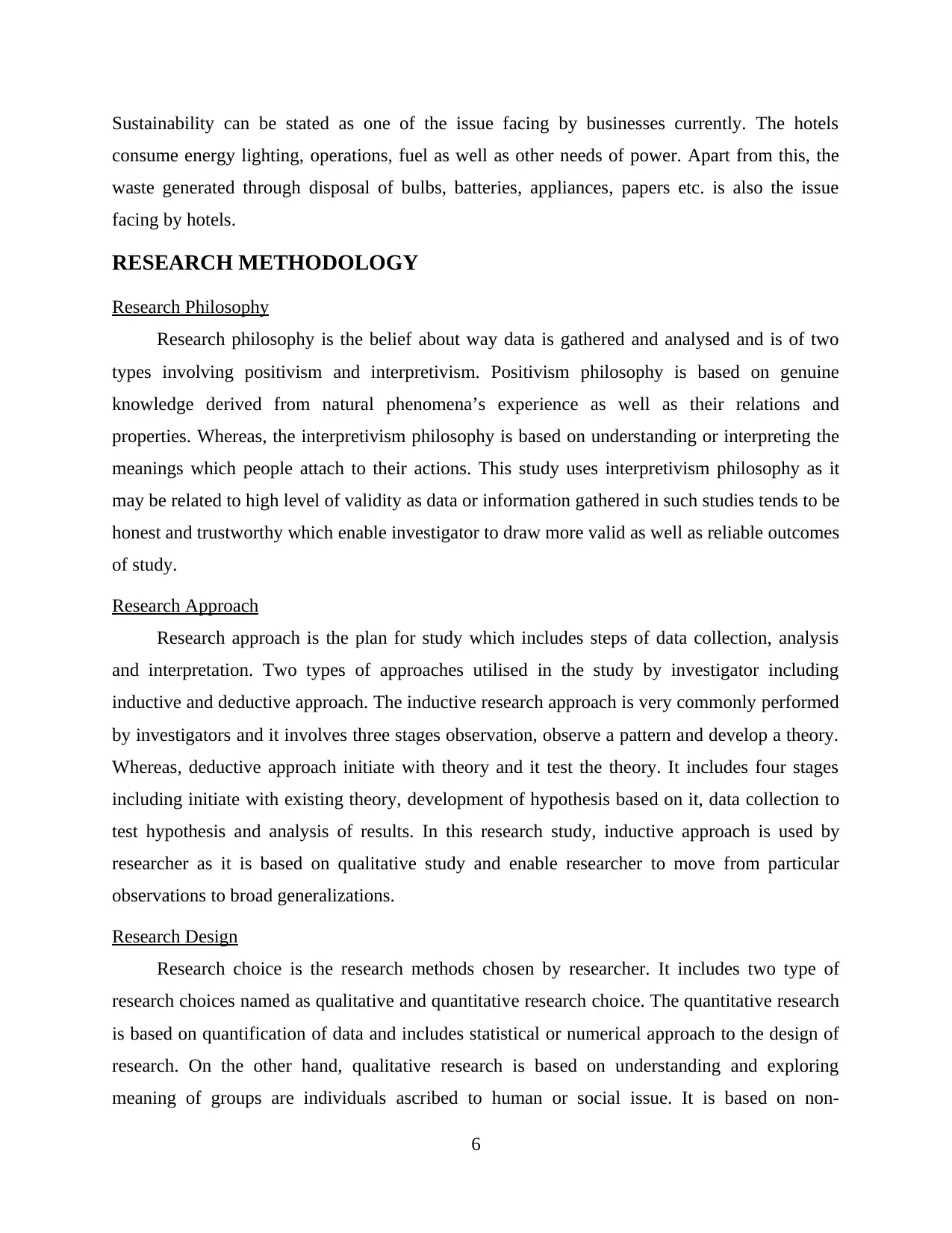
Sustainability can be stated as one of the issue facing by businesses currently. The hotels
consume energy lighting, operations, fuel as well as other needs of power. Apart from this, the
waste generated through disposal of bulbs, batteries, appliances, papers etc. is also the issue
facing by hotels.
RESEARCH METHODOLOGY
Research Philosophy
Research philosophy is the belief about way data is gathered and analysed and is of two
types involving positivism and interpretivism. Positivism philosophy is based on genuine
knowledge derived from natural phenomena’s experience as well as their relations and
properties. Whereas, the interpretivism philosophy is based on understanding or interpreting the
meanings which people attach to their actions. This study uses interpretivism philosophy as it
may be related to high level of validity as data or information gathered in such studies tends to be
honest and trustworthy which enable investigator to draw more valid as well as reliable outcomes
of study.
Research Approach
Research approach is the plan for study which includes steps of data collection, analysis
and interpretation. Two types of approaches utilised in the study by investigator including
inductive and deductive approach. The inductive research approach is very commonly performed
by investigators and it involves three stages observation, observe a pattern and develop a theory.
Whereas, deductive approach initiate with theory and it test the theory. It includes four stages
including initiate with existing theory, development of hypothesis based on it, data collection to
test hypothesis and analysis of results. In this research study, inductive approach is used by
researcher as it is based on qualitative study and enable researcher to move from particular
observations to broad generalizations.
Research Design
Research choice is the research methods chosen by researcher. It includes two type of
research choices named as qualitative and quantitative research choice. The quantitative research
is based on quantification of data and includes statistical or numerical approach to the design of
research. On the other hand, qualitative research is based on understanding and exploring
meaning of groups are individuals ascribed to human or social issue. It is based on non-
6
consume energy lighting, operations, fuel as well as other needs of power. Apart from this, the
waste generated through disposal of bulbs, batteries, appliances, papers etc. is also the issue
facing by hotels.
RESEARCH METHODOLOGY
Research Philosophy
Research philosophy is the belief about way data is gathered and analysed and is of two
types involving positivism and interpretivism. Positivism philosophy is based on genuine
knowledge derived from natural phenomena’s experience as well as their relations and
properties. Whereas, the interpretivism philosophy is based on understanding or interpreting the
meanings which people attach to their actions. This study uses interpretivism philosophy as it
may be related to high level of validity as data or information gathered in such studies tends to be
honest and trustworthy which enable investigator to draw more valid as well as reliable outcomes
of study.
Research Approach
Research approach is the plan for study which includes steps of data collection, analysis
and interpretation. Two types of approaches utilised in the study by investigator including
inductive and deductive approach. The inductive research approach is very commonly performed
by investigators and it involves three stages observation, observe a pattern and develop a theory.
Whereas, deductive approach initiate with theory and it test the theory. It includes four stages
including initiate with existing theory, development of hypothesis based on it, data collection to
test hypothesis and analysis of results. In this research study, inductive approach is used by
researcher as it is based on qualitative study and enable researcher to move from particular
observations to broad generalizations.
Research Design
Research choice is the research methods chosen by researcher. It includes two type of
research choices named as qualitative and quantitative research choice. The quantitative research
is based on quantification of data and includes statistical or numerical approach to the design of
research. On the other hand, qualitative research is based on understanding and exploring
meaning of groups are individuals ascribed to human or social issue. It is based on non-
6
⊘ This is a preview!⊘
Do you want full access?
Subscribe today to unlock all pages.

Trusted by 1+ million students worldwide
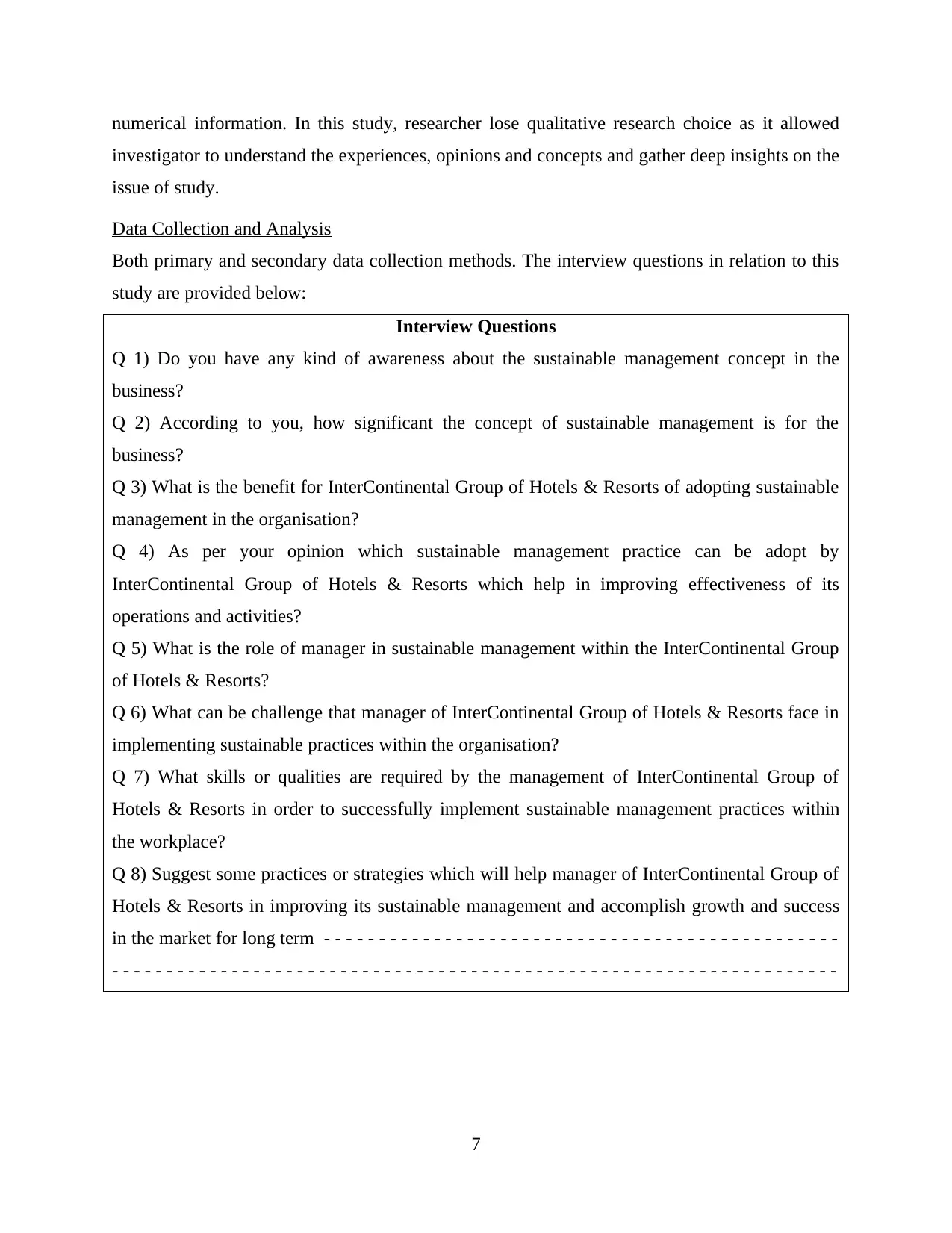
numerical information. In this study, researcher lose qualitative research choice as it allowed
investigator to understand the experiences, opinions and concepts and gather deep insights on the
issue of study.
Data Collection and Analysis
Both primary and secondary data collection methods. The interview questions in relation to this
study are provided below:
Interview Questions
Q 1) Do you have any kind of awareness about the sustainable management concept in the
business?
Q 2) According to you, how significant the concept of sustainable management is for the
business?
Q 3) What is the benefit for InterContinental Group of Hotels & Resorts of adopting sustainable
management in the organisation?
Q 4) As per your opinion which sustainable management practice can be adopt by
InterContinental Group of Hotels & Resorts which help in improving effectiveness of its
operations and activities?
Q 5) What is the role of manager in sustainable management within the InterContinental Group
of Hotels & Resorts?
Q 6) What can be challenge that manager of InterContinental Group of Hotels & Resorts face in
implementing sustainable practices within the organisation?
Q 7) What skills or qualities are required by the management of InterContinental Group of
Hotels & Resorts in order to successfully implement sustainable management practices within
the workplace?
Q 8) Suggest some practices or strategies which will help manager of InterContinental Group of
Hotels & Resorts in improving its sustainable management and accomplish growth and success
in the market for long term - - - - - - - - - - - - - - - - - - - - - - - - - - - - - - - - - - - - - - - - - - - - - - -
- - - - - - - - - - - - - - - - - - - - - - - - - - - - - - - - - - - - - - - - - - - - - - - - - - - - - - - - - - - - - - - - - - -
7
investigator to understand the experiences, opinions and concepts and gather deep insights on the
issue of study.
Data Collection and Analysis
Both primary and secondary data collection methods. The interview questions in relation to this
study are provided below:
Interview Questions
Q 1) Do you have any kind of awareness about the sustainable management concept in the
business?
Q 2) According to you, how significant the concept of sustainable management is for the
business?
Q 3) What is the benefit for InterContinental Group of Hotels & Resorts of adopting sustainable
management in the organisation?
Q 4) As per your opinion which sustainable management practice can be adopt by
InterContinental Group of Hotels & Resorts which help in improving effectiveness of its
operations and activities?
Q 5) What is the role of manager in sustainable management within the InterContinental Group
of Hotels & Resorts?
Q 6) What can be challenge that manager of InterContinental Group of Hotels & Resorts face in
implementing sustainable practices within the organisation?
Q 7) What skills or qualities are required by the management of InterContinental Group of
Hotels & Resorts in order to successfully implement sustainable management practices within
the workplace?
Q 8) Suggest some practices or strategies which will help manager of InterContinental Group of
Hotels & Resorts in improving its sustainable management and accomplish growth and success
in the market for long term - - - - - - - - - - - - - - - - - - - - - - - - - - - - - - - - - - - - - - - - - - - - - - -
- - - - - - - - - - - - - - - - - - - - - - - - - - - - - - - - - - - - - - - - - - - - - - - - - - - - - - - - - - - - - - - - - - -
7
Paraphrase This Document
Need a fresh take? Get an instant paraphrase of this document with our AI Paraphraser
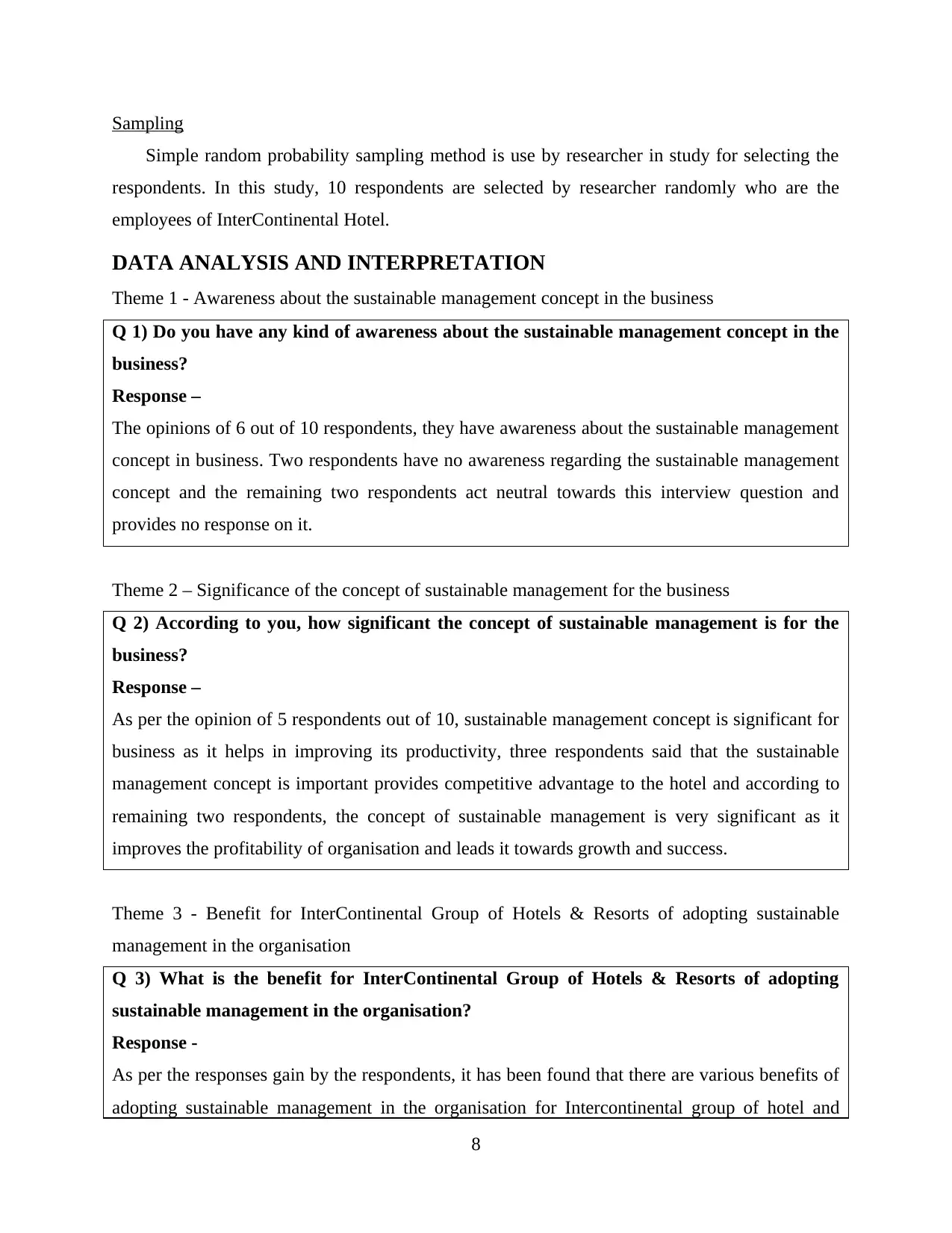
Sampling
Simple random probability sampling method is use by researcher in study for selecting the
respondents. In this study, 10 respondents are selected by researcher randomly who are the
employees of InterContinental Hotel.
DATA ANALYSIS AND INTERPRETATION
Theme 1 - Awareness about the sustainable management concept in the business
Q 1) Do you have any kind of awareness about the sustainable management concept in the
business?
Response –
The opinions of 6 out of 10 respondents, they have awareness about the sustainable management
concept in business. Two respondents have no awareness regarding the sustainable management
concept and the remaining two respondents act neutral towards this interview question and
provides no response on it.
Theme 2 – Significance of the concept of sustainable management for the business
Q 2) According to you, how significant the concept of sustainable management is for the
business?
Response –
As per the opinion of 5 respondents out of 10, sustainable management concept is significant for
business as it helps in improving its productivity, three respondents said that the sustainable
management concept is important provides competitive advantage to the hotel and according to
remaining two respondents, the concept of sustainable management is very significant as it
improves the profitability of organisation and leads it towards growth and success.
Theme 3 - Benefit for InterContinental Group of Hotels & Resorts of adopting sustainable
management in the organisation
Q 3) What is the benefit for InterContinental Group of Hotels & Resorts of adopting
sustainable management in the organisation?
Response -
As per the responses gain by the respondents, it has been found that there are various benefits of
adopting sustainable management in the organisation for Intercontinental group of hotel and
8
Simple random probability sampling method is use by researcher in study for selecting the
respondents. In this study, 10 respondents are selected by researcher randomly who are the
employees of InterContinental Hotel.
DATA ANALYSIS AND INTERPRETATION
Theme 1 - Awareness about the sustainable management concept in the business
Q 1) Do you have any kind of awareness about the sustainable management concept in the
business?
Response –
The opinions of 6 out of 10 respondents, they have awareness about the sustainable management
concept in business. Two respondents have no awareness regarding the sustainable management
concept and the remaining two respondents act neutral towards this interview question and
provides no response on it.
Theme 2 – Significance of the concept of sustainable management for the business
Q 2) According to you, how significant the concept of sustainable management is for the
business?
Response –
As per the opinion of 5 respondents out of 10, sustainable management concept is significant for
business as it helps in improving its productivity, three respondents said that the sustainable
management concept is important provides competitive advantage to the hotel and according to
remaining two respondents, the concept of sustainable management is very significant as it
improves the profitability of organisation and leads it towards growth and success.
Theme 3 - Benefit for InterContinental Group of Hotels & Resorts of adopting sustainable
management in the organisation
Q 3) What is the benefit for InterContinental Group of Hotels & Resorts of adopting
sustainable management in the organisation?
Response -
As per the responses gain by the respondents, it has been found that there are various benefits of
adopting sustainable management in the organisation for Intercontinental group of hotel and
8
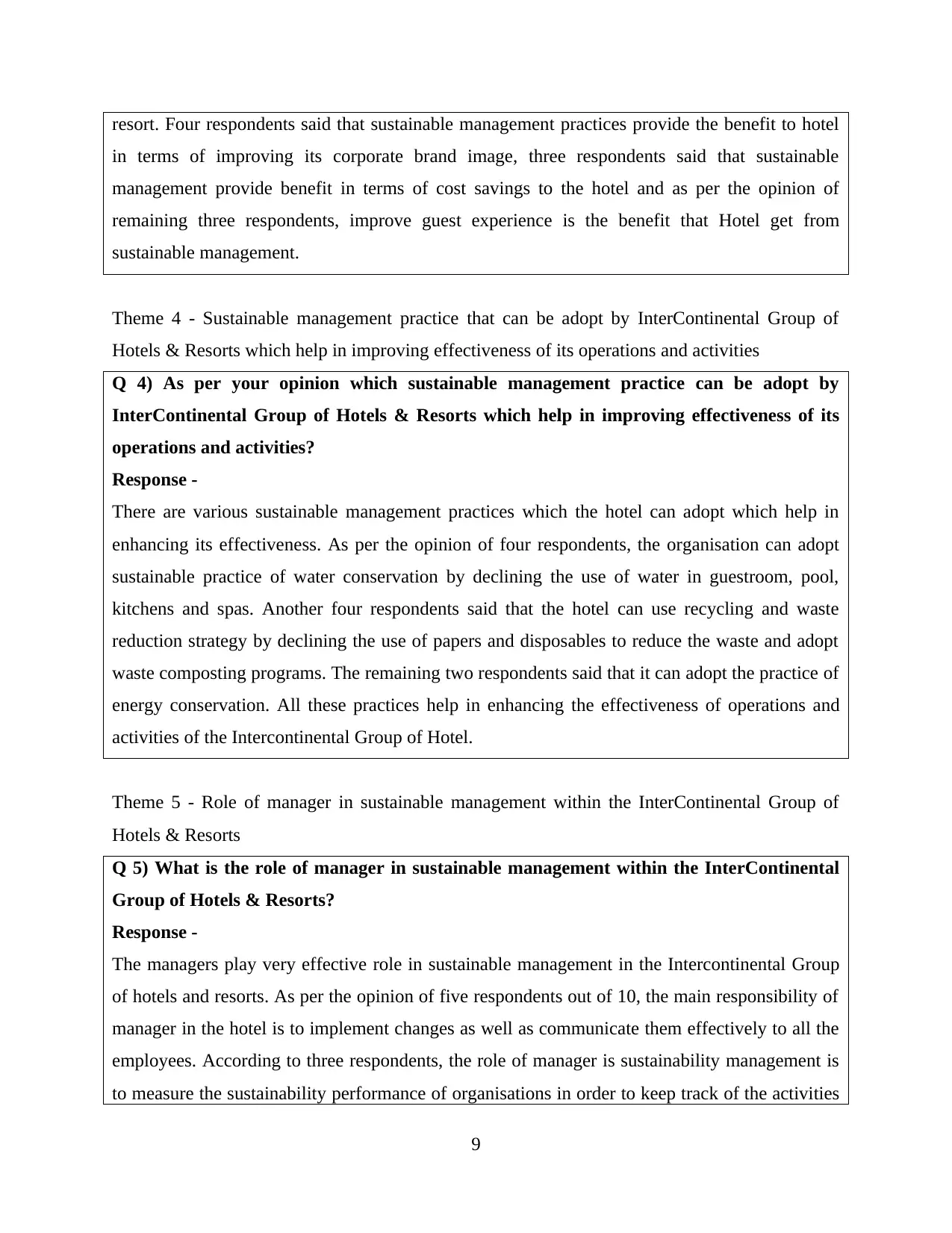
resort. Four respondents said that sustainable management practices provide the benefit to hotel
in terms of improving its corporate brand image, three respondents said that sustainable
management provide benefit in terms of cost savings to the hotel and as per the opinion of
remaining three respondents, improve guest experience is the benefit that Hotel get from
sustainable management.
Theme 4 - Sustainable management practice that can be adopt by InterContinental Group of
Hotels & Resorts which help in improving effectiveness of its operations and activities
Q 4) As per your opinion which sustainable management practice can be adopt by
InterContinental Group of Hotels & Resorts which help in improving effectiveness of its
operations and activities?
Response -
There are various sustainable management practices which the hotel can adopt which help in
enhancing its effectiveness. As per the opinion of four respondents, the organisation can adopt
sustainable practice of water conservation by declining the use of water in guestroom, pool,
kitchens and spas. Another four respondents said that the hotel can use recycling and waste
reduction strategy by declining the use of papers and disposables to reduce the waste and adopt
waste composting programs. The remaining two respondents said that it can adopt the practice of
energy conservation. All these practices help in enhancing the effectiveness of operations and
activities of the Intercontinental Group of Hotel.
Theme 5 - Role of manager in sustainable management within the InterContinental Group of
Hotels & Resorts
Q 5) What is the role of manager in sustainable management within the InterContinental
Group of Hotels & Resorts?
Response -
The managers play very effective role in sustainable management in the Intercontinental Group
of hotels and resorts. As per the opinion of five respondents out of 10, the main responsibility of
manager in the hotel is to implement changes as well as communicate them effectively to all the
employees. According to three respondents, the role of manager is sustainability management is
to measure the sustainability performance of organisations in order to keep track of the activities
9
in terms of improving its corporate brand image, three respondents said that sustainable
management provide benefit in terms of cost savings to the hotel and as per the opinion of
remaining three respondents, improve guest experience is the benefit that Hotel get from
sustainable management.
Theme 4 - Sustainable management practice that can be adopt by InterContinental Group of
Hotels & Resorts which help in improving effectiveness of its operations and activities
Q 4) As per your opinion which sustainable management practice can be adopt by
InterContinental Group of Hotels & Resorts which help in improving effectiveness of its
operations and activities?
Response -
There are various sustainable management practices which the hotel can adopt which help in
enhancing its effectiveness. As per the opinion of four respondents, the organisation can adopt
sustainable practice of water conservation by declining the use of water in guestroom, pool,
kitchens and spas. Another four respondents said that the hotel can use recycling and waste
reduction strategy by declining the use of papers and disposables to reduce the waste and adopt
waste composting programs. The remaining two respondents said that it can adopt the practice of
energy conservation. All these practices help in enhancing the effectiveness of operations and
activities of the Intercontinental Group of Hotel.
Theme 5 - Role of manager in sustainable management within the InterContinental Group of
Hotels & Resorts
Q 5) What is the role of manager in sustainable management within the InterContinental
Group of Hotels & Resorts?
Response -
The managers play very effective role in sustainable management in the Intercontinental Group
of hotels and resorts. As per the opinion of five respondents out of 10, the main responsibility of
manager in the hotel is to implement changes as well as communicate them effectively to all the
employees. According to three respondents, the role of manager is sustainability management is
to measure the sustainability performance of organisations in order to keep track of the activities
9
⊘ This is a preview!⊘
Do you want full access?
Subscribe today to unlock all pages.

Trusted by 1+ million students worldwide
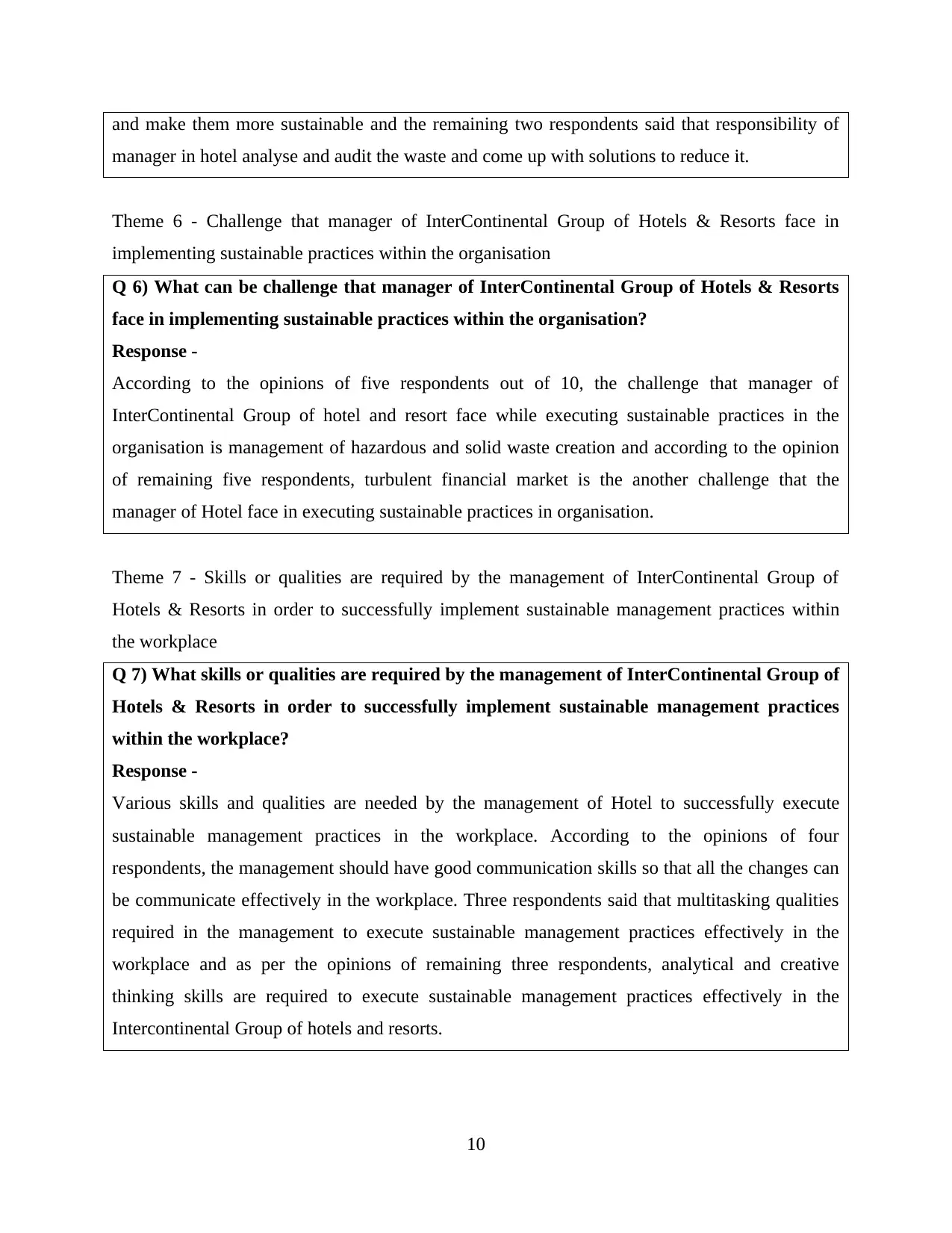
and make them more sustainable and the remaining two respondents said that responsibility of
manager in hotel analyse and audit the waste and come up with solutions to reduce it.
Theme 6 - Challenge that manager of InterContinental Group of Hotels & Resorts face in
implementing sustainable practices within the organisation
Q 6) What can be challenge that manager of InterContinental Group of Hotels & Resorts
face in implementing sustainable practices within the organisation?
Response -
According to the opinions of five respondents out of 10, the challenge that manager of
InterContinental Group of hotel and resort face while executing sustainable practices in the
organisation is management of hazardous and solid waste creation and according to the opinion
of remaining five respondents, turbulent financial market is the another challenge that the
manager of Hotel face in executing sustainable practices in organisation.
Theme 7 - Skills or qualities are required by the management of InterContinental Group of
Hotels & Resorts in order to successfully implement sustainable management practices within
the workplace
Q 7) What skills or qualities are required by the management of InterContinental Group of
Hotels & Resorts in order to successfully implement sustainable management practices
within the workplace?
Response -
Various skills and qualities are needed by the management of Hotel to successfully execute
sustainable management practices in the workplace. According to the opinions of four
respondents, the management should have good communication skills so that all the changes can
be communicate effectively in the workplace. Three respondents said that multitasking qualities
required in the management to execute sustainable management practices effectively in the
workplace and as per the opinions of remaining three respondents, analytical and creative
thinking skills are required to execute sustainable management practices effectively in the
Intercontinental Group of hotels and resorts.
10
manager in hotel analyse and audit the waste and come up with solutions to reduce it.
Theme 6 - Challenge that manager of InterContinental Group of Hotels & Resorts face in
implementing sustainable practices within the organisation
Q 6) What can be challenge that manager of InterContinental Group of Hotels & Resorts
face in implementing sustainable practices within the organisation?
Response -
According to the opinions of five respondents out of 10, the challenge that manager of
InterContinental Group of hotel and resort face while executing sustainable practices in the
organisation is management of hazardous and solid waste creation and according to the opinion
of remaining five respondents, turbulent financial market is the another challenge that the
manager of Hotel face in executing sustainable practices in organisation.
Theme 7 - Skills or qualities are required by the management of InterContinental Group of
Hotels & Resorts in order to successfully implement sustainable management practices within
the workplace
Q 7) What skills or qualities are required by the management of InterContinental Group of
Hotels & Resorts in order to successfully implement sustainable management practices
within the workplace?
Response -
Various skills and qualities are needed by the management of Hotel to successfully execute
sustainable management practices in the workplace. According to the opinions of four
respondents, the management should have good communication skills so that all the changes can
be communicate effectively in the workplace. Three respondents said that multitasking qualities
required in the management to execute sustainable management practices effectively in the
workplace and as per the opinions of remaining three respondents, analytical and creative
thinking skills are required to execute sustainable management practices effectively in the
Intercontinental Group of hotels and resorts.
10
Paraphrase This Document
Need a fresh take? Get an instant paraphrase of this document with our AI Paraphraser
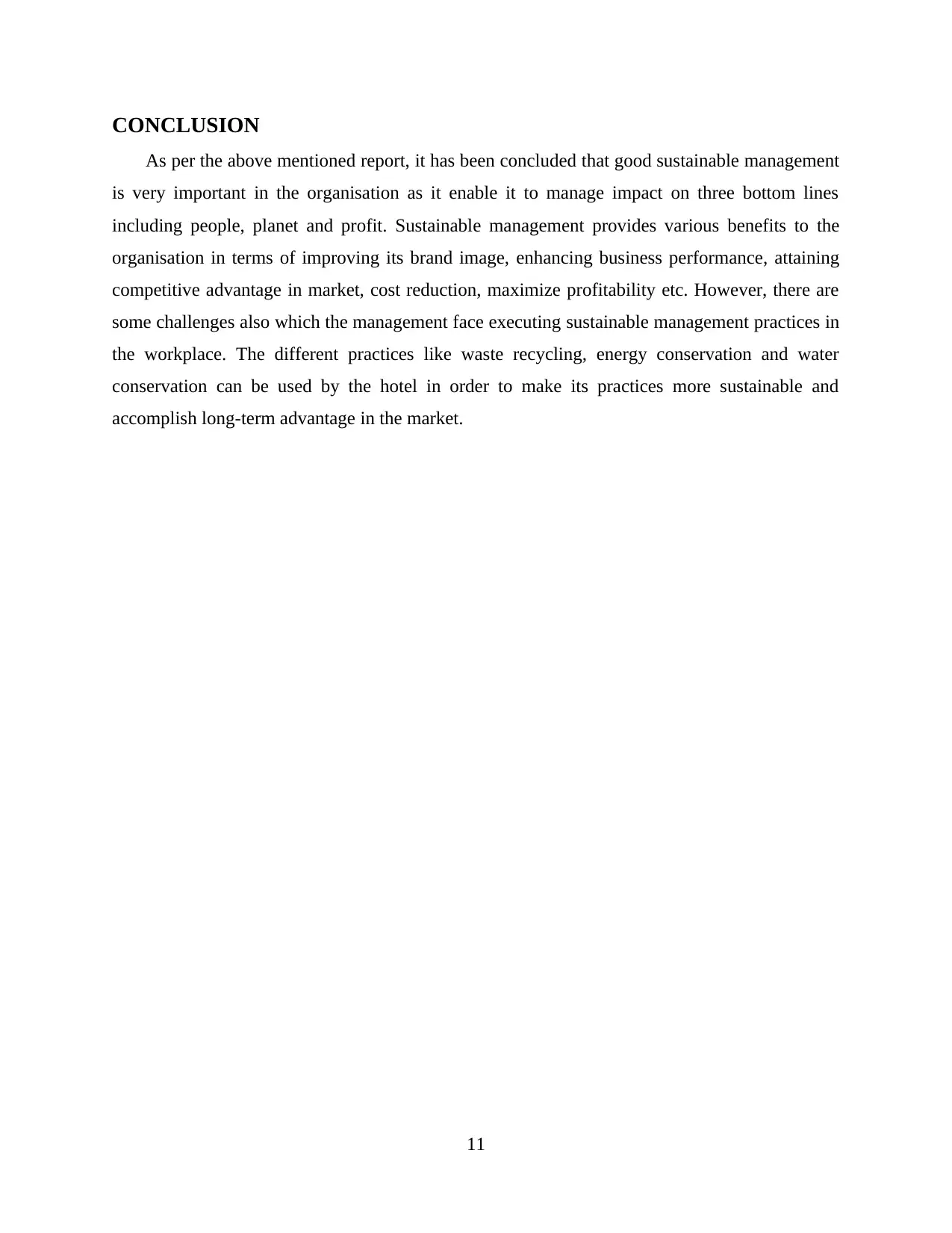
CONCLUSION
As per the above mentioned report, it has been concluded that good sustainable management
is very important in the organisation as it enable it to manage impact on three bottom lines
including people, planet and profit. Sustainable management provides various benefits to the
organisation in terms of improving its brand image, enhancing business performance, attaining
competitive advantage in market, cost reduction, maximize profitability etc. However, there are
some challenges also which the management face executing sustainable management practices in
the workplace. The different practices like waste recycling, energy conservation and water
conservation can be used by the hotel in order to make its practices more sustainable and
accomplish long-term advantage in the market.
11
As per the above mentioned report, it has been concluded that good sustainable management
is very important in the organisation as it enable it to manage impact on three bottom lines
including people, planet and profit. Sustainable management provides various benefits to the
organisation in terms of improving its brand image, enhancing business performance, attaining
competitive advantage in market, cost reduction, maximize profitability etc. However, there are
some challenges also which the management face executing sustainable management practices in
the workplace. The different practices like waste recycling, energy conservation and water
conservation can be used by the hotel in order to make its practices more sustainable and
accomplish long-term advantage in the market.
11
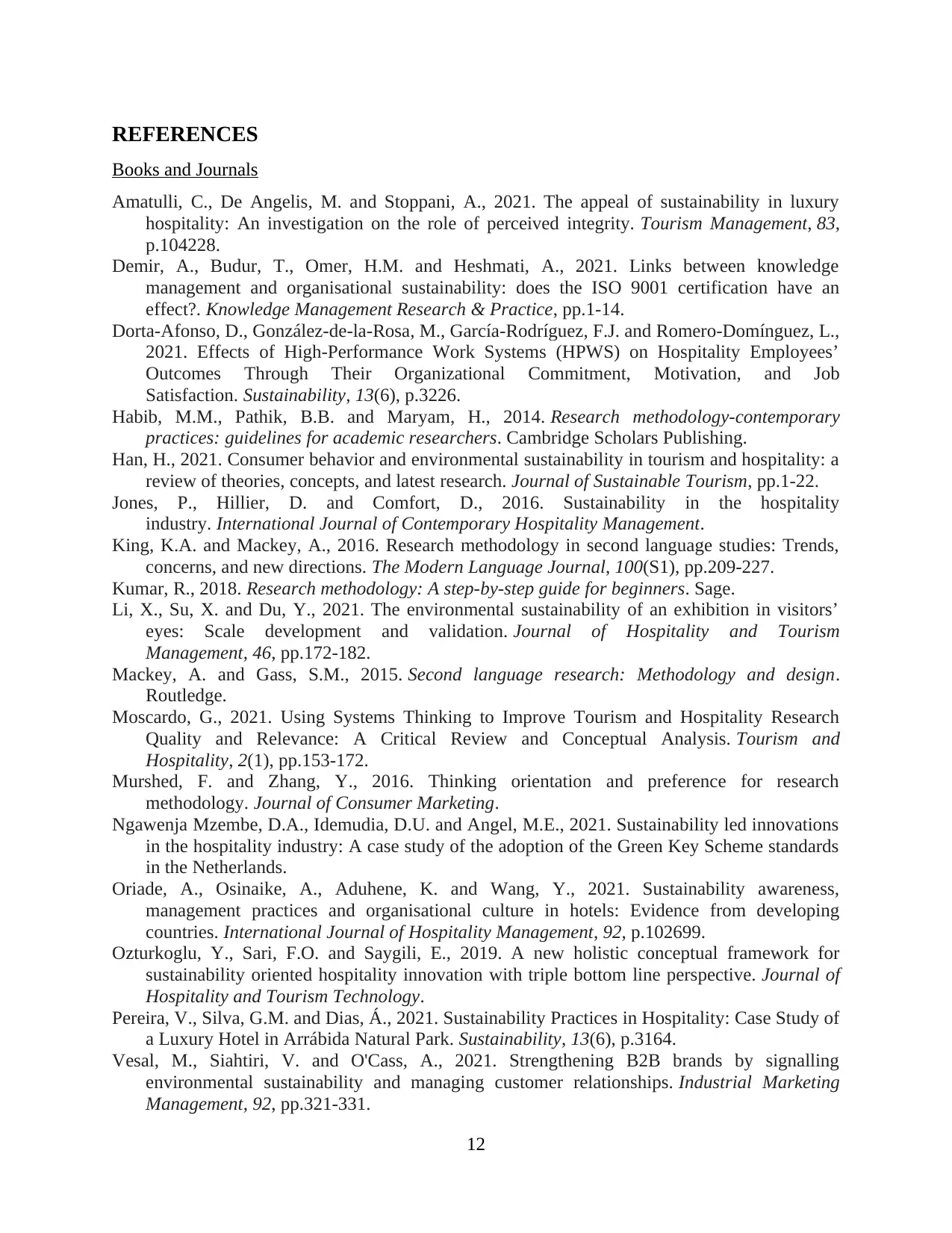
REFERENCES
Books and Journals
Amatulli, C., De Angelis, M. and Stoppani, A., 2021. The appeal of sustainability in luxury
hospitality: An investigation on the role of perceived integrity. Tourism Management, 83,
p.104228.
Demir, A., Budur, T., Omer, H.M. and Heshmati, A., 2021. Links between knowledge
management and organisational sustainability: does the ISO 9001 certification have an
effect?. Knowledge Management Research & Practice, pp.1-14.
Dorta-Afonso, D., González-de-la-Rosa, M., García-Rodríguez, F.J. and Romero-Domínguez, L.,
2021. Effects of High-Performance Work Systems (HPWS) on Hospitality Employees’
Outcomes Through Their Organizational Commitment, Motivation, and Job
Satisfaction. Sustainability, 13(6), p.3226.
Habib, M.M., Pathik, B.B. and Maryam, H., 2014. Research methodology-contemporary
practices: guidelines for academic researchers. Cambridge Scholars Publishing.
Han, H., 2021. Consumer behavior and environmental sustainability in tourism and hospitality: a
review of theories, concepts, and latest research. Journal of Sustainable Tourism, pp.1-22.
Jones, P., Hillier, D. and Comfort, D., 2016. Sustainability in the hospitality
industry. International Journal of Contemporary Hospitality Management.
King, K.A. and Mackey, A., 2016. Research methodology in second language studies: Trends,
concerns, and new directions. The Modern Language Journal, 100(S1), pp.209-227.
Kumar, R., 2018. Research methodology: A step-by-step guide for beginners. Sage.
Li, X., Su, X. and Du, Y., 2021. The environmental sustainability of an exhibition in visitors’
eyes: Scale development and validation. Journal of Hospitality and Tourism
Management, 46, pp.172-182.
Mackey, A. and Gass, S.M., 2015. Second language research: Methodology and design.
Routledge.
Moscardo, G., 2021. Using Systems Thinking to Improve Tourism and Hospitality Research
Quality and Relevance: A Critical Review and Conceptual Analysis. Tourism and
Hospitality, 2(1), pp.153-172.
Murshed, F. and Zhang, Y., 2016. Thinking orientation and preference for research
methodology. Journal of Consumer Marketing.
Ngawenja Mzembe, D.A., Idemudia, D.U. and Angel, M.E., 2021. Sustainability led innovations
in the hospitality industry: A case study of the adoption of the Green Key Scheme standards
in the Netherlands.
Oriade, A., Osinaike, A., Aduhene, K. and Wang, Y., 2021. Sustainability awareness,
management practices and organisational culture in hotels: Evidence from developing
countries. International Journal of Hospitality Management, 92, p.102699.
Ozturkoglu, Y., Sari, F.O. and Saygili, E., 2019. A new holistic conceptual framework for
sustainability oriented hospitality innovation with triple bottom line perspective. Journal of
Hospitality and Tourism Technology.
Pereira, V., Silva, G.M. and Dias, Á., 2021. Sustainability Practices in Hospitality: Case Study of
a Luxury Hotel in Arrábida Natural Park. Sustainability, 13(6), p.3164.
Vesal, M., Siahtiri, V. and O'Cass, A., 2021. Strengthening B2B brands by signalling
environmental sustainability and managing customer relationships. Industrial Marketing
Management, 92, pp.321-331.
12
Books and Journals
Amatulli, C., De Angelis, M. and Stoppani, A., 2021. The appeal of sustainability in luxury
hospitality: An investigation on the role of perceived integrity. Tourism Management, 83,
p.104228.
Demir, A., Budur, T., Omer, H.M. and Heshmati, A., 2021. Links between knowledge
management and organisational sustainability: does the ISO 9001 certification have an
effect?. Knowledge Management Research & Practice, pp.1-14.
Dorta-Afonso, D., González-de-la-Rosa, M., García-Rodríguez, F.J. and Romero-Domínguez, L.,
2021. Effects of High-Performance Work Systems (HPWS) on Hospitality Employees’
Outcomes Through Their Organizational Commitment, Motivation, and Job
Satisfaction. Sustainability, 13(6), p.3226.
Habib, M.M., Pathik, B.B. and Maryam, H., 2014. Research methodology-contemporary
practices: guidelines for academic researchers. Cambridge Scholars Publishing.
Han, H., 2021. Consumer behavior and environmental sustainability in tourism and hospitality: a
review of theories, concepts, and latest research. Journal of Sustainable Tourism, pp.1-22.
Jones, P., Hillier, D. and Comfort, D., 2016. Sustainability in the hospitality
industry. International Journal of Contemporary Hospitality Management.
King, K.A. and Mackey, A., 2016. Research methodology in second language studies: Trends,
concerns, and new directions. The Modern Language Journal, 100(S1), pp.209-227.
Kumar, R., 2018. Research methodology: A step-by-step guide for beginners. Sage.
Li, X., Su, X. and Du, Y., 2021. The environmental sustainability of an exhibition in visitors’
eyes: Scale development and validation. Journal of Hospitality and Tourism
Management, 46, pp.172-182.
Mackey, A. and Gass, S.M., 2015. Second language research: Methodology and design.
Routledge.
Moscardo, G., 2021. Using Systems Thinking to Improve Tourism and Hospitality Research
Quality and Relevance: A Critical Review and Conceptual Analysis. Tourism and
Hospitality, 2(1), pp.153-172.
Murshed, F. and Zhang, Y., 2016. Thinking orientation and preference for research
methodology. Journal of Consumer Marketing.
Ngawenja Mzembe, D.A., Idemudia, D.U. and Angel, M.E., 2021. Sustainability led innovations
in the hospitality industry: A case study of the adoption of the Green Key Scheme standards
in the Netherlands.
Oriade, A., Osinaike, A., Aduhene, K. and Wang, Y., 2021. Sustainability awareness,
management practices and organisational culture in hotels: Evidence from developing
countries. International Journal of Hospitality Management, 92, p.102699.
Ozturkoglu, Y., Sari, F.O. and Saygili, E., 2019. A new holistic conceptual framework for
sustainability oriented hospitality innovation with triple bottom line perspective. Journal of
Hospitality and Tourism Technology.
Pereira, V., Silva, G.M. and Dias, Á., 2021. Sustainability Practices in Hospitality: Case Study of
a Luxury Hotel in Arrábida Natural Park. Sustainability, 13(6), p.3164.
Vesal, M., Siahtiri, V. and O'Cass, A., 2021. Strengthening B2B brands by signalling
environmental sustainability and managing customer relationships. Industrial Marketing
Management, 92, pp.321-331.
12
⊘ This is a preview!⊘
Do you want full access?
Subscribe today to unlock all pages.

Trusted by 1+ million students worldwide
1 out of 13
Related Documents
Your All-in-One AI-Powered Toolkit for Academic Success.
+13062052269
info@desklib.com
Available 24*7 on WhatsApp / Email
![[object Object]](/_next/static/media/star-bottom.7253800d.svg)
Unlock your academic potential
Copyright © 2020–2026 A2Z Services. All Rights Reserved. Developed and managed by ZUCOL.





